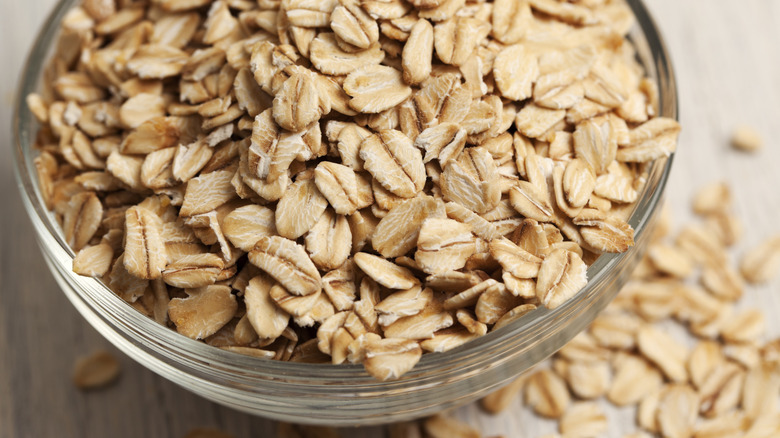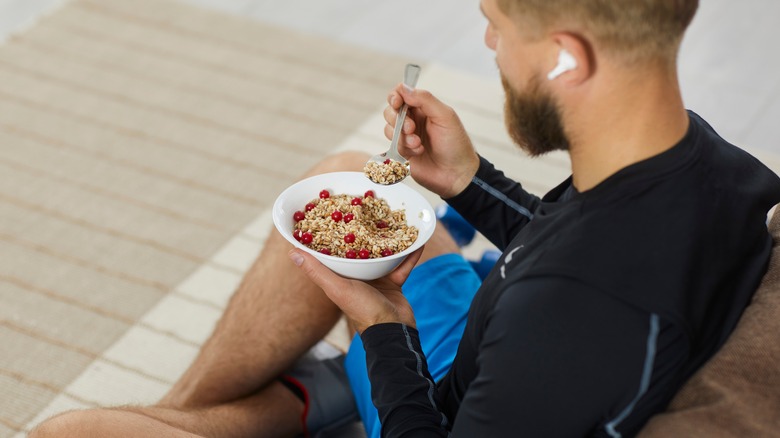The Popular Breakfast Food That Can Lower Your High Cholesterol
Contrary to what you may think, your body needs a certain amount of cholesterol to perform a few key functions, namely, to produce hormones including estrogen and testosterone, assist with metabolic function, generate vitamin D, and even aid digestion. Most of the cholesterol you need actually comes naturally. Your liver produces a large quantity of it while your diet adds in about 25% of additional cholesterol, per registered licensed dietician, Charlotte Lawson (via ExpertVillage Leaf Group). That being said, when you have high cholesterol, your health concerns can grow rapidly.
While plaque buildup in the walls of your arteries (also known as atherosclerosis) is a more immediate concern, coronary heart disease, high blood pressure, peripheral vascular disease, angina, heart attack, and stroke are all worrisome too. This is typically also when you start to think about which foods to eat and which foods to avoid for your cholesterol. Breakfast, being the first meal of the day, sets the tone when it comes to your health, and one popular breakfast food has generally been advocated as a superfood for lowering high cholesterol. We're, of course, referring to oats or oatmeal.
How do oats lower your cholesterol levels?
Experts point toward a soluble fiber you can find in oats for its cholesterol-lowering properties called beta-glucan. As registered dietician Novella Lui explained, "Soluble fiber dissolves in water, turning into a gel and acting as a sponge that binds to cholesterol and fats and removing them from the blood stream to be excreted," (via EatingWell). Further, beta-glucan is thought to alter your gut microbiome in such a way that it promotes removal of excess cholesterol via waste, per a 2019 study published in Frontiers in Nutrition, shedding light on the theory that your gut could be the secret to lowering high cholesterol.
Cholesterol readings measure the levels of low-density lipoprotein or LDL cholesterol (also known as "bad" cholesterol), triglycerides, and high-density lipoprotein or HDL cholesterol ("good" cholesterol) in the body. You want lower levels of the first two and a higher reading for the last. After eight weeks of consuming beta-glucan, both non-HDL cholesterol markers and total cholesterol saw significant decreases, per a 2020 study published in the journal Nutrients.
Cholesterol-related benefits aside, oats contain a whole host of vitamins and minerals that are good for your health. We're talking manganese, phosphorous, copper, vitamin B1, iron, selenium, magnesium, and zinc. They're also full of phytonutrients, which offer antioxidant and anti-inflammatory benefits.
Things to consider when consuming oats to lower cholesterol
Not all oats are made equal. It is important to note that the amount of fiber in this breakfast food varies depending on what kind you consume. The least-processed steel-cut oats retain their whole oat kernels (therefore, taking a lot more time to cook). Quick oats and instant oats, on the other hand, tend to be thinner, making them easier to cook but less nutritious overall. A lot of instant oat varieties that come in small ready-to-make sachets also contain additives like sugars and flavorings. Thus, instant oats can cause your blood sugar to increase more rapidly.
How the oats are processed could matter when it comes to the food's cholesterol-lowering effect too. For example, per a 2018 study published in Food and Function, unrefined oats with some of the plant-tissue intact were more efficient at lowering cholesterol levels than the more purified variety. The study also looked at how liquid-based oats had more consistent reductions in cholesterol when compared with semi-solid or solid varieties. According to a 2015 study published in Lipids in Health and Disease, boiled oatmeal had a more effective lipid-lowering response than brewed oatmeal.
There are healthy ways to eat oats and other ways to avoid. As far as plain oats go — steel-cut or rolled — the nutritional profile isn't all that different, according to experts, so it just comes down to personal preference. But instant oats that are loaded up with additives might not be the best choice. Regular oats prepared as oatmeal are arguably the best way to go.


